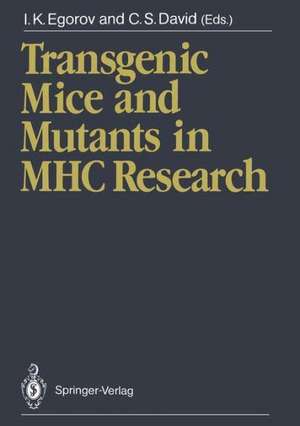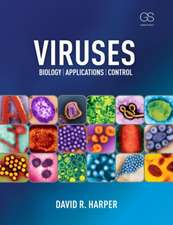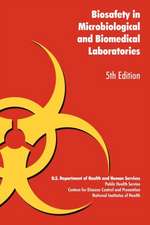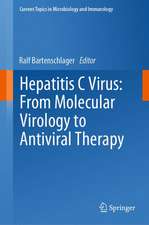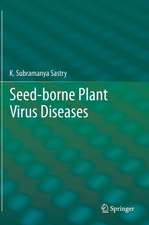Transgenic Mice and Mutants in MHC Research
Editat de Igor K. Egorov, Chella S. Daviden Limba Engleză Paperback – 13 dec 2011
Preț: 720.47 lei
Preț vechi: 758.38 lei
-5% Nou
Puncte Express: 1081
Preț estimativ în valută:
137.86€ • 144.32$ • 114.07£
137.86€ • 144.32$ • 114.07£
Carte tipărită la comandă
Livrare economică 07-21 aprilie
Preluare comenzi: 021 569.72.76
Specificații
ISBN-13: 9783642754449
ISBN-10: 3642754449
Pagini: 336
Ilustrații: XV, 317 p.
Dimensiuni: 170 x 242 x 18 mm
Greutate: 0.54 kg
Ediția:Softcover reprint of the original 1st ed. 1990
Editura: Springer Berlin, Heidelberg
Colecția Springer
Locul publicării:Berlin, Heidelberg, Germany
ISBN-10: 3642754449
Pagini: 336
Ilustrații: XV, 317 p.
Dimensiuni: 170 x 242 x 18 mm
Greutate: 0.54 kg
Ediția:Softcover reprint of the original 1st ed. 1990
Editura: Springer Berlin, Heidelberg
Colecția Springer
Locul publicării:Berlin, Heidelberg, Germany
Public țintă
ResearchCuprins
I. Mutant Models of MHC Antigen Expression and Function (H-2).- Spontaneous Frequency of H-2 Mutations.- Microgene Conversion in the Evolution of the MHC Class I Multigene Family.- Random Mutagenesis by Oligonucleotides: A Probe for MHC Structure and Function.- Altered Recognition of LCMV Antigen Presented on Mutant Class I Molecules.- Relationship Between Class II Structure and B Cell Signaling.- Multivalent Requirement for the Stimulation of Alloreactive T Cells: Studies with Engineered Soluble MHC Class I Proteins In Vitro and In Vivo.- Novel MHC Variants Spliced by Overlap Extension.- The Functional Significance of Amino Acid Polymorphisms in Class I MHC Molecules.- Products of Separate Genes Encoded Within Minor Histocompatibility Loci Stimulate Class I and Class II MHC-Restricted T Cells.- Determination of Distinction Odortypes by Mutation of Class I and Class II MHC Genes.- II. Mutants of MHC Genes as Probes of Immunological Function (HLA).- Analysis of HLA-B27-Specific T-Cell Epitopes with Site-Directed Mutants Mimicking HLA-B27 Polymorphism.- The Role of Amino Acid Position and Side Chain Structure in Serological and CTL-Defined Epitopes on the HLA-A2.1 Molecule.- Two Amino Acids on the ? Helical Region of the ?1 Domain Form Multiple Epitopes Recognized by HLA-Bw52 Specific Human Cytotoxic T Cell.- III. Regulation of MHC Gene Expression.- Mouse Mammary Tumor Virus-Directed Gene Expression in Transgenic Mice.- Regulation of Class I MHC Expression: In Vivo Function of Regulatory DNA Sequence Elements in Transgenic Mice.- Expression of a Non-Classical Class I Gene in Transgenic Mice.- Regulation of Expression of Human MHC Class I Heavy (HLA-B7) and Light (h?2-m) Chain Genes in Transgenic Mice.- Cloned Trans-Acting Factors that Bind to the Regulatory Elements ofthe Major Histocompatibility Complex Class I Gene.- Transcriptional Regulation of MHC Class II Gene Expression: Are MHC Class II Genes Coordinately Regulated?.- The Effect of Copy Number on mRNA and Cell Surface Expression of an A?k Transgene.- Construction of Retroviral Vectors for the Study of Tissue-Specific Regulation of Human MHC Class II Genes.- IV. Expression and Function of Class I Genes in Transgenic Mice.- Male Sterility in HLA-B27-Transgenic Mice.- The Lyt-2 Accessory Molecule is Responsible for the Weak Mouse Anti-HLA Xeno-Response.- Human HLA-B27 Antigen in Transgenic Mice can Function as a Major Histocompatibility Antigen.- Cytotoxic T Cell Responses Against Human Class I Molecules in Normal and HLA-A2.1 Transgenic Mice.- Analysis of the HLA-Cw3 Specific CTL Response of HLA-B7x Human ?2 Microglobulin Transgenic Mice.- H-2-Restricted Recognition of Xeno-MHC Antigens by Primary Mouse Cytotoxic T Cells is the Exception Rather than the Rule.- Copy Number and the Presence of Human ?2-Microglobulin Control Cell Surface Expression of HLA-B27 Antigen in Transgenic Mice with a 25 kb B27 Gene Fragment.- Expression and Function in a Transgenic Mouse of an H-2Kb Variant Gene Obtained by Site-Directed Mutagenesis in a Kbm1 Mutant Mouse.- V. Expression and Function of Class II Genes in Transgenic Mice.- Clonal Anergy in Transgenic Mice with Pancreatic Expression of MHC Class II I-E.- Role of Ia Antigens in Clonal Deletion of T Cells: Studies with Recombinant and Transgenic Mice.- Transgenic Mice with MHC Class II Genes: The Use in the Study of Allelic ?/? Chain Pairing and the Production of Engineered Mice with Mutant I-A Genes.- T Cell Recognition of Major Histocompatibility Complex Antigens in HLA Class II Transgenic Mice.- VI. Transgenic and Mutant Models ofDisease.- HLA-B27 and Arthritis.- HLA-B27 Transgenic Mice as Potential Models of Human Disease.- Mouse Mutants Affecting Growth and Metastasis of a Syngeneic Tumor.- Transgene Induced MHC Mismatch Results in Rapid Natural Killer Cell Dependent Elimination of Lymphoma Cells.- Highly Immunogenic Transformed Tumor Clones Expressing Allogeneic Class I Histocompatibility Gene Demonstrate a Specific Immunotherapeutic Affect Against the Parental Tumor.- Graft Specific MHC Class II Gene Expression During Allograft Response.- Influence of MHC and Non-MHC Genes on Tumorigenesis and the Use of the Recombinant Congenic Strains as a Novel Tool for the Genetic Analysis of Tumor Susceptibility.
